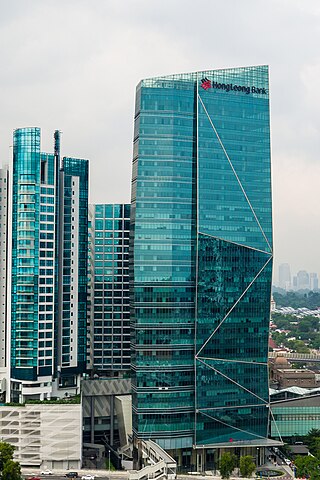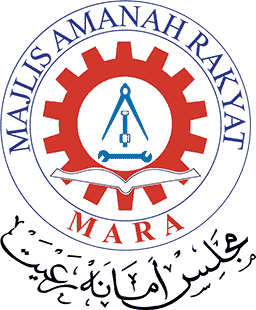
The economy of Malaysia is an emerging and developing, upper-middle income, highly industrialised, mixed economy. It ranks the 36th largest in the world in terms of nominal GDP, however, when measured by purchasing power parity, its GDP climbs to the 30th largest. Malaysia is forecasted to have a nominal GDP of nearly half a trillion US$ by the end of 2024. The labour productivity of Malaysian workers is the third highest in ASEAN and significantly higher than Indonesia, Vietnam, and the Philippines.
Keretapi Tanah Melayu Berhad (KTMB) or Malayan Railway Limited, colloquially referred to simply as KTM, is the main rail operator in Peninsular Malaysia. The railway system dates back to the British colonial era, when it was first built to transport tin. Previously known as the Federated Malay States Railways (FMSR) the Malayan Railway Administration (MRA), and the Malayan Railway, Keretapi Tanah Melayu acquired its current name in 1962. The organisation was corporatised in 1992, but remains wholly owned by the Malaysian government.
YTL Corporation is a Malaysian conglomerate.

Hong Leong Bank Berhad is a major public listed banking group in Malaysia.

Johor Corporation (JCorp) is Johor’s principal development institution for the State of Johor, Malaysia. Headquartered in Johor Bahru, its operations extend across multiple countries including Malaysia, Singapore, Indonesia, Brunei, Australia, Thailand, Cambodia and Bangladesh.

Majlis Amanah Rakyat is a Malaysian government agency. It was formed to aid, train, and guide Bumiputra in the areas of business and industry. MARA was formed on 1 March 1966, under the Rural and National Development Ministry.

UDA Holdings Berhad is a Malaysian holding company. It served to launch and oversee urban development projects related to business, industry, and housing. It was also tasked with developing urban infrastructure. After undergoing a couple of status changes, it now exists as UDA Holdings Berhad, a publicly listed company.
YTL Power International Berhad is a subsidiary of YTL Corporation Berhad, one of the largest companies listed on Bursa Malaysia. As of June 2024, the total combined group market capitalisation is RM 103.65 billion. Furthermore, YTL Corp and YTL Power were listed in the Fortune Southeast Asia 500 for the year 2024, ranking 47th and 78th, respectively. The ranking of the 500 Largest Companies in Southeast Asia is based on the revenue for the fiscal year 2023. As of November 2023, YTL Corp and YTL Power are included as constituents of the FTSE Bursa Malaysia KLCI index.
The East Coast Economic Region is an economic development region based on the east coast of Peninsular Malaysia, which covers the states of Kelantan, Terengganu, and Pahang, and the Johorean districts of Mersing and Segamat. ECER is also one of the three economic corridors launched in Peninsular Malaysia under the leadership of Abdullah Ahmad Badawi, the fifth Prime Minister of Malaysia. The other corridors are Iskandar Malaysia in Johor and the Northern Corridor Economic Region (NCER) that covers the states of Penang, Kedah, Perlis and Perak. The ECER development program spans 12 years, beginning in 2007, and involves Public-Private Participation (PPP).

Medini Iskandar Malaysia (MIM) is a suburb in Iskandar Puteri, Johor Bahru District, Johor, Malaysia.
Port Klang Free Zone (PKFZ) is a 1,000-acre (4.0 km2) commercial and industrial zone established in 2004 in Malaysia. It is a regional distribution hub as well as a trade and logistics centre offering extensive distribution and manufacturing facilities. It is located along the Straits of Malacca, Port Klang, Klang, Malaysia. The PKFZ was previously managed by Jebel Ali Free Zone Authority (JAFZA). However, it was taken over and rebranded by a local company in 2007. The PKFZ offers various investment incentives to investors such as tax exemptions on most products and services, subsidies, allowing wholly foreign owned enterprises, free repatriation of capital and profits and incentives for research and development, training and export.

The energy policy of Malaysia is determined by the Malaysian Government, which address issues of energy production, distribution, and consumption. The Department of Electricity and Gas Supply acts as the regulator while other players in the energy sector include energy supply and service companies, research and development institutions and consumers. Government-linked companies Petronas and Tenaga Nasional Berhad are major players in Malaysia's energy sector.
Water supply and sanitation in Malaysia is characterised by numerous achievements, as well as some challenges. Universal access to water supply at affordable tariffs is a substantial achievement. The government has also shown a commitment to make the sector more efficient, to create a sustainable funding mechanism and to improve the customer orientation of service providers through sector reforms enacted in 2006. The reform creates a modern institutional structure for the water sector, including an autonomous regulatory agency, an asset management company and commercialised state water companies that have to reach certain key performance indicators that will be monitored by the regulatory agency. The government has also stated its intention not to embark on new private sector contracts for water provision, after a bout of such contracts during the 1990s showed mixed results.

The Ministry of Finance, abbreviated MOF, is a ministry of the Government of Malaysia that is charged with the responsibility for government expenditure and revenue raising. The ministry's role is to develop economic policy and prepare the Malaysian federal budget. The Ministry of Finance also oversees financial legislation and regulation. Each year in October, the Minister of Finance presents the Malaysian federal budget to the Parliament.

The Ministry of Investment, Trade and Industry, abbreviated MITI, is a ministry of the Government of Malaysia that is responsible for international trade, industry, investment, productivity, small and medium enterprise, development finance institution, halal industry, automotive, steel, strategic trade. The ministry has its headquarters located at Menara MITI on Jalan Sultan Haji Ahmad Shah in Kuala Lumpur and the building is also a component of Naza TTDI’s 75.5-acre KL Metropolis, a mixed development that is envisioned to be the International Trade and Exhibition District for Kuala Lumpur. It is one of the three ministries that has not moved to Putrajaya.

The Greater Penang Conurbation, also known as the George Town Conurbation, is the urban area within and surrounding the Malaysian state of Penang, including parts of neighbouring Kedah and Perak. It was home to over 2.84 million people as of 2020, the second largest metropolitan area in Malaysia after the Klang Valley. The conurbation is also the second largest economy in the country after the Klang Valley, with an estimated gross domestic product (GDP) of US$30.2 billion in 2020.

Sime Darby Property Berhad 197301002148 (15631-P) is a Malaysian real estate developer with operations in Malaysia and the United Kingdom. Incorporated in 1973, as Sime Darby Property Sdn. Bhd., the Group was created through the integration of the property arms under the former Golden Hope Plantations Berhad, Kumpulan Guthrie Berhad, and Sime Darby Berhad. The property arm of Sime Darby traces back to United Estates Projects Berhad, a property development company established in 1964. In 1985, Sime Darby purchased a large stake in United Estates Projects Berhad and the company was renamed Sime UEP Properties Berhad. Sime UEP was used to develop former oil palm plantation lands belonging to Sime Darby.
Lim Kang Hoo is a Malaysian businessman and investor. He is the founder, chairman and chief executive of Iskandar Waterfront Holdings and Ekovest Berhad. Both corporations manage infrastructure construction projects, as well as mega property development. Tan Sri Lim is also linked to other public listed companies in directorial roles; PLS plantations, holding 40,000 acres in palm oil plantations and Knusford Berhad and Tebrau Teguh Berhad.










